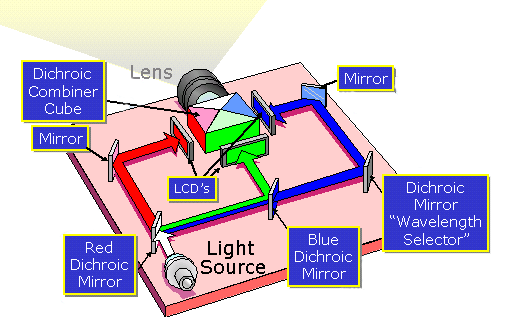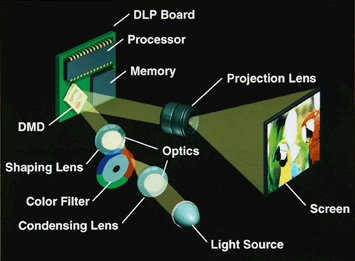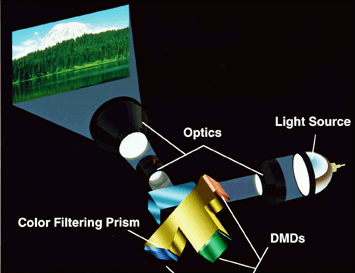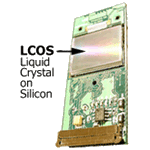Display Definitions
In the Projector People tradition, we have done the research for you. Here is a fast and easy look at how the reigning champions of display technology work. We have also included the hottest new contenders that are trying to make their way to the big time.
LCD (Liquid Crystal Display)
Most LCD projectors have three panels. Each panel is a prism that allows blue, red or green light through its pixels. These separate colors are then converged and projected. Electrical signals turn on pixels within a set based on the resolution of the unit. LCDs are known to produce greater color definition, offering more shades or variations of color than single-chip DLP® projectors. DLP® projectors can sometimes burn definition out of the highlights and shadows with their vibrant colors. Newer LCD projectors include special optics enhancers like micro-lens array that minimize pixelization known as the "screen door effect." New LCD projectors have contrast ratios as high as 200,000:1. By comparison, DLP® projectors contrast ratios are as high as 50,000:1. The portability and brightness of LCD projectors have made them a popular choice for traveling presenters. The lightest LCD projectors weigh-in at just under 4 lbs.

DLP® (single chip) - Digital Light Processing
The single-chip DLP® is the most portable of all our players. Currently you can find single-chip DLP® projectors that weigh less than 1 pound. Digital Light Processing is the product of the great minds at Texas Instruments. DLP® uses a single Digital Mirror Device (DMD) chip that has thousands of tiny mirrors, each representing a single pixel. These mirrors tilt back and forth and deflect light as indicated by the source to create the image. One limitation of DLP® technology thus far is brightness. Currently most of the brightest single-chip DLP® projectors on the market are just 3,000 lumens compared to the 6,000+ lumens of comparably priced LCD's and three-chip DLP® projectors. Brighter single chip DLP® projectors are available, but are significantly more expensive. However, because of their deep, rich blacks and high contrast ratios, DLP® projectors have been a popular choice among home theater enthusiasts.
Image and Flash demo reproduced courtesy of Texas Instruments

DLP® (three-chip) - Digital Light Processing
The three-chip DLP® has the best looking images of all the players. The three-chip system is much like the single-chip DLP® only better. The image quality of the three-chip DLP® is unsurpassed. Unfortunately it is also the most expensive. Today's three-chip DLP® projectors cost anywhere from $15,000-$30,000 or higher. Unlike CRTs and single-chip DLP® projectors, three-chip DLP® can have very high lumen output levels.
Image reproduced courtesy of Texas Instruments

Looking for a projector? Click here or call (888) 248-0675
LCoS - Liquid Crystal on Silicon
'LCoS' stands for 'liquid crystal on a silicon wafer'. The newest player in the display game, think of LCoS as a combination of the best of LCD and DLP technologies. LCD is a transmissive technology whereas DLP is reflective. LCoS, in very simple terms, is a combination of the two - an LCD panel on a mirror. The amount of pixels is less restricted than LCD or DLP because the electronics can be placed under the pixel rather than next to it. This high pixel density means high resolution. (In fact, most of today's LCoS projectors start at SXGA resolution.) The high pixel density also means no flickering, no 'screen door' effect, no 'rainbows,' and an overall higher picture quality on moving images. Because of this, many viewers say LCoS projects the most film-like image.
Image courtesy of Hitachi

